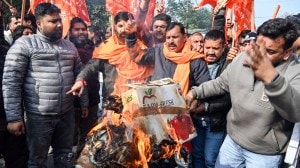WTO talks slip towards breakdown
The mini-ministerial talks of the World Trade Organisation8217;s Doha Round swayed back from showing signs of progress on Friday...

The mini-ministerial talks of the World Trade Organisation8217;s WTO Doha Round swayed back from showing signs of progress on Friday evening to a possible breakdown on Monday evening, with differences between the rich and poor nations, over market-opening commitments in agriculture and industrial goods, coming to the fore more than ever before.
Though India and the US did not take names officially, they blamed each other for stalling the progress of the talks. Indian commerce minister Kamal Nath said on Monday evening that there was no movement on the overall trade distorting farm subsidies and the cotton subsidies of the US and the Special Safeguard Mechanism SSM. Nath said SSM was a clause for helping the poorest of the poor in 90 countries from import surges of subsidised farm products of the rich world.
He said the proposal put forward by WTO director general Pascal Lamy made the operation of the SSM 8220;not workable.8221; He said India does not agree with Lamy8217;s paper and there was 8220;no ambiguity in that.8221;
On the US allegation that some large emerging countries were causing problems in clinching a global trade deal, Nath retorted that, 8220;We are large, I can8217;t help that. We are emerging and no body should brush that.8221;
Earlier, US Trade Representative Susan Schwab said the US was concerned about the direction that a couple of countries were taking. Claiming that on Friday night the core group of seven leading members from the developed and developing world 8212; India, Brazil, China, the European Union, US, Japan and Australia 8212; had moved forward for a successful outcome of the seven-year-old Doha Development Round talks, Schwab, however, said there was a risk of a couple of nations advocating a 8220;selective reopening of package8221;.
Schwab said there was a real threat now to the delicate balance that the group of seven countries had achieved on Friday, adding that the differences could jeopardize the outcome of the Round.
Meanwhile, India on Monday refused a demand by the developed nations for including a provision known as 8216;sectorals8217; for mandatory elimination of duties in sectors like auto, auto components, textiles, marine products and chemicals in the final global trade deal agreement.
- 01
- 02
- 03
- 04
- 05































